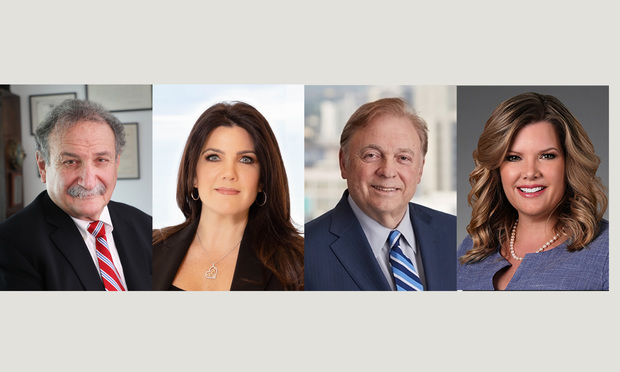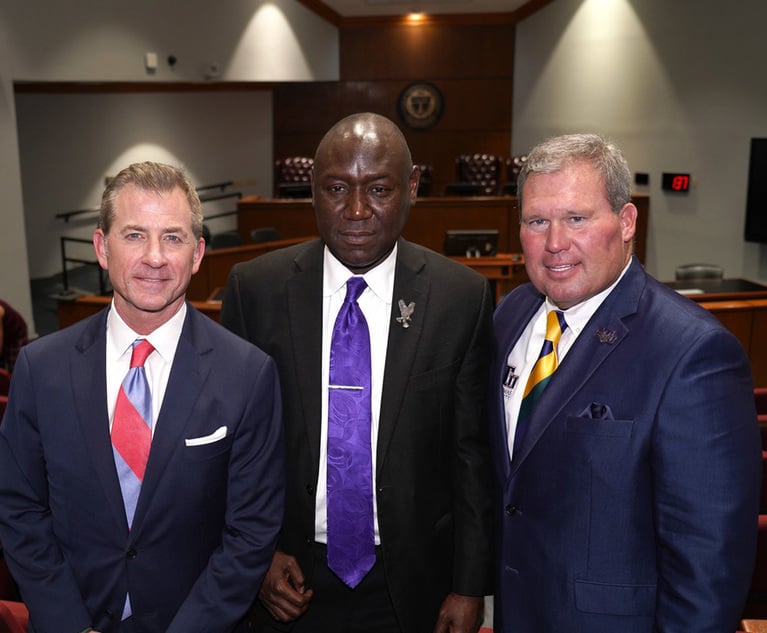South Florida Litigators Raise Concerns Over Courts' Long-Term Adoption of Zoom
Veteran trial lawyer Joel Hirschhorn is choosing to postpone three jury trials in the next year because he feels Zoom proceedings lose some of the elements of surprise and drama that can ensue during courtroom litigation.
May 26, 2020 at 03:08 PM
4 minute read
 From left: Joel Hircshhorn of Gray Robinson, Aliette DelPozo Rodz of Shutts & Bowen, Stephen N. Zack of Boies Schiller Flexner, and Christina Paul of K&L Gates.
From left: Joel Hircshhorn of Gray Robinson, Aliette DelPozo Rodz of Shutts & Bowen, Stephen N. Zack of Boies Schiller Flexner, and Christina Paul of K&L Gates.
Some South Florida lawyers have a bone to pick with Zoom but also acknowledge its potential to facilitate litigation practice during and after the COVID-19 shutdown.
Joel Hirschhorn, a shareholder at GrayRobinson in Miami, for instance, said there is something about the "roar of the greasepaint and the smell of the crowd" that is lost by using Zoom to facilitate hearings and court testimony.
To make his point about losing the rush of emotions that come from being in the courtroom, Hirschhorn pointed to a federal court case where he was tactically cross-examining a witness.
The man "slammed his hand on the bar in front of the witness stand and said, 'You want to go outside and settle this man to man?' " Hirschhorn said. "Of course, everybody in the courtroom cracked up. The judge said in his southern accent, 'Mr. Hirschhorn, I believe you made your point. I don't think any further cross-examination is necessary.' You won't get those moments."
Lost elements
Hirschhorn said those elements of surprise and the drama that can ensue are critical to courtroom litigation.
Zoom will hinder that, he said.
That is the reason the veteran trial lawyer, whose career has included landmark cases defending pornographers, drug kingpins and U.S. congressmen, is choosing to postpone three jury trials in the next year.
Christina Paul, a partner at K&L Gates in Miami, has had a smooth transition with the switch from in-person hearings to having remote, Zoom hearings. Yet, she finds some of the camaraderie is lost when she has cases before the Miami-Dade Circuit Court that are now conducted through Zoom.
"You come in and you see people that you practice with," Paul said. "You see people that you've gone to law school with and there's a connection that emanates out of that building. So sitting behind a desk at your home, you lose that sort of aura that you get when you walk into that building and the connection that you get with your fellow bar members."
Zoom technology has become essential in the coronavirus reality that has generated stay-at-home orders and strict social distancing rules. Before COVID-19, video calls were a novelty. Yet they have now become a necessity.
Stephen N. Zack, a partner at Boies Schiller Flexner in Miami, said lawyers are becoming more comfortable with Zoom. Before the coronavirus pandemic, Zack thought it did not make much sense to "go to a one-day hearing in Chicago from Miami."
"A day going, a day coming, and sitting around waiting for your flight," Zack said. "I strongly believe it will never go back to the way it was because people realize there is an alternative that may be more efficient going forward."
Still, that efficiency can come at a price. Zoom just released a draft design on GitHub for end-to-end encryption as part of its plan for "major security and privacy upgrades." Previously, Zoom software raised privacy concerns as the communication application became a widely reported target for hackers.
While not as threatening as a full-blown data breach, partner Aliette Rodz of Shutts & Bowen in Miami warns other lawyers of a severe mistake that litigators can make when utilizing remote communications — the possibility of revealing documentation that could jeopardize confidential conversations. Her recommendation is to make sure that before sharing your screen, you set up links to the documents you intend to share on your desktop to ensure you are not sharing information about other documents or clients in your database.
"Have your documents properly earmarked so you're not going into your own database because otherwise, you would be showing your database to the people that are on your Zoom hearing," Rodz said. "You have attorney-client privileges. It's prudent to make sure."
This content has been archived. It is available through our partners, LexisNexis® and Bloomberg Law.
To view this content, please continue to their sites.
Not a Lexis Subscriber?
Subscribe Now
Not a Bloomberg Law Subscriber?
Subscribe Now
NOT FOR REPRINT
© 2025 ALM Global, LLC, All Rights Reserved. Request academic re-use from www.copyright.com. All other uses, submit a request to [email protected]. For more information visit Asset & Logo Licensing.
You Might Like
View All
11th Circ.: Contempt Conviction Against Nonparty Requires Proof of Aiding and Abetting Bound Party

St. Thomas University Renames Law School After Civil Rights Attorney Ben Crump
4 minute read

Law Firms Mentioned
Trending Stories
- 1Paul Hastings, Recruiting From Davis Polk, Continues Finance Practice Build
- 2Chancery: Common Stock Worthless in 'Jacobson v. Akademos' and Transaction Was Entirely Fair
- 3'We Neither Like Nor Dislike the Fifth Circuit'
- 4Local Boutique Expands Significantly, Hiring Litigator Who Won $63M Verdict Against City of Miami Commissioner
- 5Senior Associates' Billing Rates See The Biggest Jump
Who Got The Work
J. Brugh Lower of Gibbons has entered an appearance for industrial equipment supplier Devco Corporation in a pending trademark infringement lawsuit. The suit, accusing the defendant of selling knock-off Graco products, was filed Dec. 18 in New Jersey District Court by Rivkin Radler on behalf of Graco Inc. and Graco Minnesota. The case, assigned to U.S. District Judge Zahid N. Quraishi, is 3:24-cv-11294, Graco Inc. et al v. Devco Corporation.
Who Got The Work
Rebecca Maller-Stein and Kent A. Yalowitz of Arnold & Porter Kaye Scholer have entered their appearances for Hanaco Venture Capital and its executives, Lior Prosor and David Frankel, in a pending securities lawsuit. The action, filed on Dec. 24 in New York Southern District Court by Zell, Aron & Co. on behalf of Goldeneye Advisors, accuses the defendants of negligently and fraudulently managing the plaintiff's $1 million investment. The case, assigned to U.S. District Judge Vernon S. Broderick, is 1:24-cv-09918, Goldeneye Advisors, LLC v. Hanaco Venture Capital, Ltd. et al.
Who Got The Work
Attorneys from A&O Shearman has stepped in as defense counsel for Toronto-Dominion Bank and other defendants in a pending securities class action. The suit, filed Dec. 11 in New York Southern District Court by Bleichmar Fonti & Auld, accuses the defendants of concealing the bank's 'pervasive' deficiencies in regards to its compliance with the Bank Secrecy Act and the quality of its anti-money laundering controls. The case, assigned to U.S. District Judge Arun Subramanian, is 1:24-cv-09445, Gonzalez v. The Toronto-Dominion Bank et al.
Who Got The Work
Crown Castle International, a Pennsylvania company providing shared communications infrastructure, has turned to Luke D. Wolf of Gordon Rees Scully Mansukhani to fend off a pending breach-of-contract lawsuit. The court action, filed Nov. 25 in Michigan Eastern District Court by Hooper Hathaway PC on behalf of The Town Residences LLC, accuses Crown Castle of failing to transfer approximately $30,000 in utility payments from T-Mobile in breach of a roof-top lease and assignment agreement. The case, assigned to U.S. District Judge Susan K. Declercq, is 2:24-cv-13131, The Town Residences LLC v. T-Mobile US, Inc. et al.
Who Got The Work
Wilfred P. Coronato and Daniel M. Schwartz of McCarter & English have stepped in as defense counsel to Electrolux Home Products Inc. in a pending product liability lawsuit. The court action, filed Nov. 26 in New York Eastern District Court by Poulos Lopiccolo PC and Nagel Rice LLP on behalf of David Stern, alleges that the defendant's refrigerators’ drawers and shelving repeatedly break and fall apart within months after purchase. The case, assigned to U.S. District Judge Joan M. Azrack, is 2:24-cv-08204, Stern v. Electrolux Home Products, Inc.
Featured Firms
Law Offices of Gary Martin Hays & Associates, P.C.
(470) 294-1674
Law Offices of Mark E. Salomone
(857) 444-6468
Smith & Hassler
(713) 739-1250






